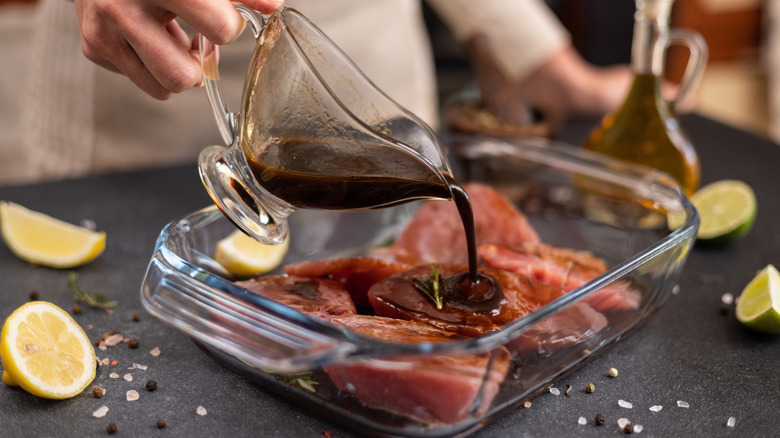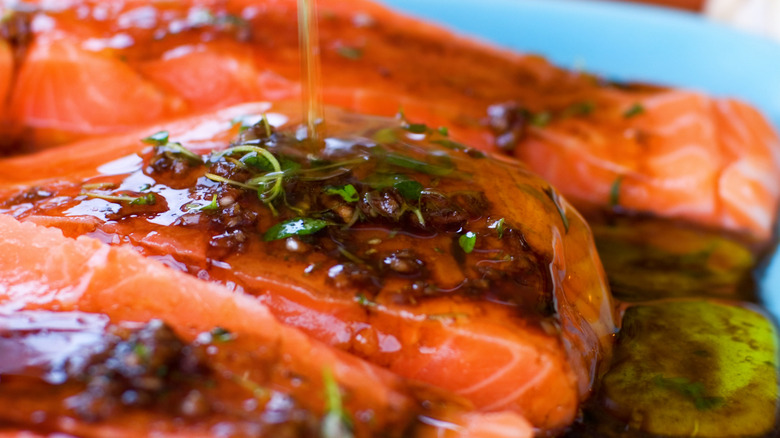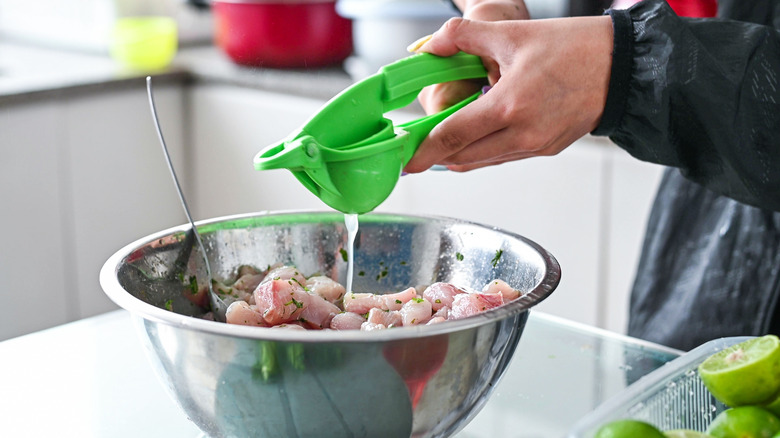Why You Shouldn't Reuse Fish Marinades
From the kitchens of Michelin-starred restaurants to barbecues at home, marinating fish is a simple and convenient way to take your fish dishes to new heights. A good marinade doesn't just upgrade the flavor: It tenderizes it, making it more forgiving when it comes to cooking and ensuring you get a flaky, beautifully soft bite every time.
Finding the right marinade can be a real challenge, so the temptation when you've dialed in the perfect recipe might be to use it again and again and again ... but you shouldn't. While it might technically be safe to use a marinade twice, you should probably avoid it, at least according to Kory Foltz, the Director of Culinary at Sunseeker Resort, a luxury hotel in Charlotte Harbor, Florida.
"I wouldn't recommend [reusing a leftover fish marinade]; I like to keep my marinades fresh and single use," he told Food Republic. Why? Well, it's all to do with the intensity of flavor. "Sometimes the marinade can pull moisture from the fish and can seep into the marinade, diluting the flavor if you were to use it a second time." So, instead of using the same batch of marinade over and over, take a leaf out of Chef Foltz's book. For the best, most flavorful fish, make a brand-new, fresh marinade every time. It might take a little longer and use a few more ingredients, but it's definitely worth it.
Delicious marinades to use for your next fish dish
The next time you're craving seafood, why not take some inspiration from Chef Kory Foltz's emphasis on freshness when it comes to marinating fish? The world really is your oyster when it comes to flavor combinations — but for a pop of freshness, you could give your sea bass a Caribbean twist with a citrusy jerk marinade. This'll help you avoid overcooking the bass (which is often quite easy to take too far) while imparting a lovely, spicy, summery flavor that'll have you longing for a sandy beach and a cold beer. For a similarly sunny feeling, blitz up some achiote and into a Mexican-inspired marinade, the perfect aromatic foundation for some barbecued seafood tacos.
For a sharp, sweet contrast to some darker, more autumnal flavors, you could try using fruit like pomegranate, which, when paired with garlic and soy, provides a deeply complex yet still fresh accompaniment to a beer-braised black cod brulée. If you're craving something a little more subtle but still deeply flavorful, take your tastebuds on a trip to the East and make a fish dish inspired by the flavors of Japanese cuisine. Whisk up some white miso and soy sauce with sesame oil before grating in some fresh ginger. You'll be left with a marinade that's salty and packed with umami (and, importantly, freshness from the ginger), and really is the king of fish marinades — plus, it's easy to make!
Other marinating rules to keep in mind
Not reusing your marinades is a helpful rule when you want the absolute best out of your fish, but it's not the only one. There are plenty of tips and tricks (and things you should avoid) when it comes to perfecting marinated fish. One common pitfall is leaving your fish in your marinade for too long. You might see recipes recommending you leave your fish in its flavor bath overnight — but beware. Doing this can actually lead to your meat cooking before you, well, cook it. This is the same principle we apply when (deliberately) making ceviche.
Any good marinade contains an acid — be that citrus juice, vinegar, or even mayonnaise. But while that acid does a great job tenderizing your fish, making for a better texture once it cooks, leaving it in contact with the flesh for too long will begin to cure it. To avoid this, use less acid than you would for, say, a basic steak marinade — and leave it in for no longer than a couple of hours for firm fish like tuna or swordfish, or half an hour for flaky fish like sea bass.
Finally, water-based marinades can lead to soggy fish that stubbornly resist browning. For the best marinade, make sure it's oil-based. This'll allow the outside of the fish to get extra crispy on the grill while staying soft and buttery inside — and bonus points if you use a high-smoke-point oil for the best sear.



